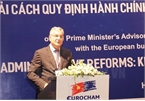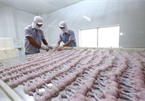Nguyen Thi Thu Trang, director of the WTO’s International Trade Centre under the Vietnam Chamber of Commerce and Industry, talked about how market access commitments are brightening the investment picture in the sector.
 |
| Nguyen Thi Thu Trang, director of the WTO’s International Trade Centre under the Vietnam Chamber of Commerce and Industry |
In the agreement (EVFTA), Vietnam commits to widely open the market in aircraft maintenance and repair service to EU businesses. In comparison with the country’s World Trade Organization (WTO) commitments, how can the new adherence benefit investors from the bloc in the future?
Aviation transport is one of the logistics services that Vietnam commits to open the market to EU businesses in the EVFTA and this commitment is more open than that in the WTO. Among them, aircraft maintenance and repair service provides the strongest opening.
As committed in the WTO, Vietnam allows foreign investors to join this market under the form of joint venture, holding less than 51 per cent. Meanwhile, this service market will totally open to EU investors without restrictions in the form of business operations, or foreign ownership limit (FOL).
This means that as of entry into force, EU companies will enjoy never-before-seen opportunities to establish a 100 per cent foreign-invested entity or joint ventures with Vietnamese partners to provide aircraft maintenance and repair service in the Southeast Asian nation.
Up till now, this golden chance has been available only in Canada, Mexico, Japan, Australia, and Singapore as committed in the Comprehensive and Progressive Agreement for Trans-Pacific Partnership.
Which other services will Vietnam open under EVFTA commitments, and what changes do you foresee?
Vietnam also pledges to open the aviation market for EU companies in other two groups of services, to which the country had no commitments in the WTO.
The first is in-flight meal services. Specifically, Vietnam permits EU businesses to establish a joint venture to provide this service with the conditions that FOL is not higher than 49 per cent.
The second is ground services but this excludes aircraft maintenance and cleaning services, ground transport, aircraft management, and guaranteed flight operations.
Meanwhile, for ground services which Vietnam does open, there is no set schedule as yet. This depends on the time when Vietnam allows private firms to join ground services in a specific airport, restrictions to location for specific airports and other licensing barriers, and the type of businesses involved.
Investment attraction in aviation remains modest. Will the new commitments be able to change the investment picture in the sector?
In the EVFTA, Vietnam will still keep the level of market opening similar to the WTO for core aviation services such as passenger and cargo transporting by air. However, looking globally, this is rather normal. Many countries have a similar approach with Vietnam while others even have a narrower approach.
From a market view, it is difficult to say that Vietnam’s aviation sector is not attractive enough for investment. Even when gaining no foreign investment, interest from local private financers remains strong.
Regardless, for aviation services the most interest among managers is not only the room for business and investment activities, but also safety concerns and public interest. The important issue is probably not only how open the country is for the aviation market for foreign investors, but also the way of approaching that openness for the private sector in general. VIR
Bich Thuy

Administrative reforms would help unlock EVFTA's potential: EuroCham
Administrative procedure reform is the key to unlocking the full potential of the Europe-Viet Nam Free Trade Agreement (EVFTA), said participants at a conference on Tuesday.

EVFTA to come into effect in a month
The EVFTA will abolish 65 per cent of the duties on EU exports to its developing partner, with the remainder phased out over a 10-year period.